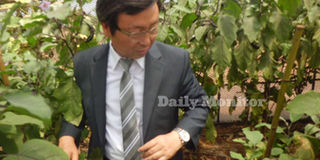Kopia gets new director, focuses on vegetables and citrus

Kopia director Dr Shim Hongsik in a greenhouse where breeding of Korean vegetables varieties is taking place at NARL Kawanda. PHOTO BY Lominda Afedraru
Scientists at National Agricultural Research Organisation (Naro) are set to carry out breeding of Korean vegetable varieties and evaluation of diseases affecting citrus fruit in eastern Uganda in a second phase of a project under the Korea Programme on International Agriculture (Kopia) Uganda.
In a board meeting held at the National Agriculture Research Laboratories (NARL) in Kawanda with the new Kopia director Dr Shim Hongsik recently, apart from breeding programmes, Kopia Uganda will support training of farmers and extension field officers as well as exchange visits between Ugandan and Korean scientists.
Farmers’ needs
It will fund cooperative projects to a tune of $30,000 (Shs101m) per year. This is in addition to a $80,000 (Shs269m) annual fund for the two projects on vegetables and citrus.
Dr Imelda Kashaija, Naro’s deputy director general, explained that like many other countries, in Uganda, Kopia funds projects that suit farmers’ needs. Hence, the focus on breeding vegetable varieties and management of citrus diseases.
During the first phase, scientists from the National Crop Resources Research Institute (NaCRRI) tested hybrid Korean cabbage varieties—namely Bulam, King Kong, Jam gim, King Kong, Chunyong and Choono—kale, eggplant, sweet pepper and a hybrid tomato among others.
Second tests
They were tested concurrently with varieties in Uganda namely Victoria F1, Dynasty F1, Barak F1 and Copenhagen.
Some varieties from Korea were found to be prone to pests though they had good germination vigour. Those that were tolerant to the pests will be tested again.
Dr Onemus Semalulu, head of the vegetable breeding team, says they are going to evaluate both Ugandan and Korean varieties this year.
Those that performed well during the first testing will be considered for pest resistance and nutrient management as well as fungicide application.
Focus on citrus
The team will also establish a store for quality seed production and processing of indigenous vegetable varieties.
In addition, the demonstration sites for both varieties will be set up in Wakiso and Nakaseke to establish how viable the exotic vegetables crops are in local climate conditions.
On the other hand, Dr John Adriko who is handling the project on citrus, explains that farmers will be sensitised about disease management. There will also be preparation of a nursery guide for farmer use, and designing of disease identification kit which can be used to diagnose diseases in the farmer fields.
Common diseases
The most common disease experienced by farmers growing citrus fruits in eastern Uganda is the Pseudocercospora fruit and leaf spot, which destroys the fruits and leaves.
There is also altrenario brown spot, which usually causes a dark spot on the fruit, and Anthracnose, which causes hard black spots on the fruit.




